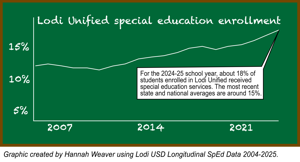Education
Lodi Unified Faces Challenges in Special Education System

When Lodi Unified School District reported that approximately 18% of its students are enrolled in special education, the figure sparked significant discussion among parents and educators. This percentage is notably higher than the statewide average and highlights the complexities within the district’s special education system.
Lisa McBride, a local parent and special education advocate, is actively working to assist other families in navigating this intricate landscape. McBride, who holds a bachelor’s degree in child development and has over three decades of teaching experience, understands the challenges many parents face. “Special education has its own set of acronyms, and its own language, and that is very, very challenging for any parent to access,” she explained.
In recent years, an increasing number of students within the Lodi Unified School District have been identified as needing special education services, reflecting a broader trend observed at both state and national levels. The rise in enrollment was discussed extensively during an August school board meeting, which was prompted by board member Victoria Lenderman. Lenderman, frustrated with the existing system, sought clarity on the rising figures.
### Understanding the Special Education Landscape
The complexities of special education are compounded by the involvement of the Special Education Local Plan Area (SELPA). The Lodi SELPA oversees special education services for Lodi Unified and several other local school districts. It operates a Community Advisory Committee, which meets quarterly to address key issues, including the implementation of Individualized Education Plans (IEPs) and the district’s dyslexia screening process.
Paul Warren, director of the Lodi SELPA, acknowledges the inherent challenges in understanding special education. “It’s hard, because special education is very complicated,” he remarked. His role encompasses compliance, budget management, and oversight of educational practices, while Erin Aitken, the district’s special education director, focuses on daily logistics such as staffing and IEP compliance.
The Lodi Unified special education enrollment statistics reveal that 4,697 students were part of these programs in the 2024-25 school year, marking a 3.3 percentage point increase since before the COVID-19 pandemic. The most common disabilities among students include speech or language impairment, and specific learning disabilities such as dyslexia.
### Evaluating Needs and Services
Students are eligible for special education if they have a disability that significantly impacts their learning. The evaluation process begins when a potential disability is identified, followed by an assessment conducted by school psychologists and specialists. According to state law, districts must set up an assessment plan within 15 school days and complete it within 60 school days.
Once a student qualifies, a team that includes teachers and parents develops their IEP, which is tailored to their individual needs. McBride emphasizes the importance of parental involvement in this process, reminding parents that they have valuable insights regarding their child.
Warren expressed concerns that the rise in enrollment might not accurately reflect the actual need for services. He noted that subjective interpretations during evaluations could be influencing these figures, indicating a possible need for more consistent assessment practices.
### Funding and Staffing Challenges
Funding for the Lodi SELPA is projected at approximately $99.4 million for the 2025-26 fiscal year. The majority of this funding originates from the enrolled school districts, with additional contributions from state and federal sources. As enrollment rises, so does the financial burden on the district, with about 20% of Lodi Unified’s anticipated $500 million budget allocated to special education.
Despite these funding increases, educators express concerns regarding understaffing. The Lodi teachers union president, Lisa Lennon Wilkins, highlighted the overwhelming responsibilities placed on educators, particularly in light of growing student numbers.
While Warren stated that there is only a potential understaffing issue with a specific autism preschool class, many teachers report feeling overwhelmed by their workload. Concerns have also been raised about the reliance on long-term substitutes and interns, who lack the credentials to participate in IEP teams.
### Addressing Concerns and Future Directions
The Lodi Unified School District is currently exploring ways to improve its special education services. This includes considering feedback from parents and educators regarding possible enhancements such as additional instructional coaches and further general education support.
Warren affirmed that the district is in the process of gathering information to inform future strategies. “We’re really just still kind of gathering information and laying the groundwork for how we want to look at this data and how we want to move forward,” he stated.
The ongoing increase in special education enrollment has prompted discussions about addressing broader educational needs. Advocates like Karma Quick-Panwala, who helps families navigate the special education landscape, argue that the surge in enrollment is a positive sign of increased awareness and availability of services.
As Lodi Unified works to address these challenges, the community remains engaged in discussions about the future of special education, aiming to ensure that all students receive the support they need to thrive academically.
-

 Technology5 months ago
Technology5 months agoDiscover the Top 10 Calorie Counting Apps of 2025
-

 Health3 months ago
Health3 months agoBella Hadid Shares Health Update After Treatment for Lyme Disease
-

 Health3 months ago
Health3 months agoErin Bates Shares Recovery Update Following Sepsis Complications
-

 Technology4 months ago
Technology4 months agoDiscover How to Reverse Image Search Using ChatGPT Effortlessly
-

 Technology1 month ago
Technology1 month agoDiscover 2025’s Top GPUs for Exceptional 4K Gaming Performance
-

 Technology3 months ago
Technology3 months agoElectric Moto Influencer Surronster Arrested in Tijuana
-

 Technology5 months ago
Technology5 months agoMeta Initiates $60B AI Data Center Expansion, Starting in Ohio
-

 Technology5 months ago
Technology5 months agoRecovering a Suspended TikTok Account: A Step-by-Step Guide
-

 Health4 months ago
Health4 months agoTested: Rab Firewall Mountain Jacket Survives Harsh Conditions
-

 Lifestyle5 months ago
Lifestyle5 months agoBelton Family Reunites After Daughter Survives Hill Country Floods
-

 Technology4 months ago
Technology4 months agoHarmonic Launches AI Chatbot App to Transform Mathematical Reasoning
-

 Health3 months ago
Health3 months agoAnalysts Project Stronger Growth for Apple’s iPhone 17 Lineup





















